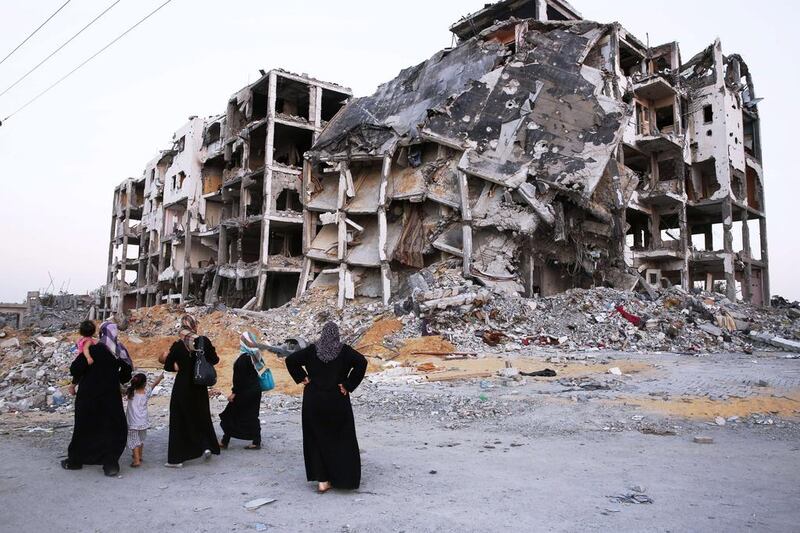As the dust settles in Gaza – and both Israel and Hamas fatuously claim “victory” in a conflict that, yet again, produced no real victors – there is no question who the biggest losers were: the long-suffering people of Gaza. For all its empty boasting, Hamas’s strategy of armed struggle has once again been exposed as not merely a dead-end for securing Palestinian rights, but a disaster.
Yet the diplomatic impasse – with no continuing process or talks, or grounds for expecting, or even hoping for, a significant breakthrough in the short-term – leaves the Palestinian movement agonising over what approach to national liberation would secure successes and not cause more harm than good.
Multilateral diplomacy at the United Nations and various agencies can be costly while delivering limited benefits. And they cannot change any core political and strategic realities on the ground. Boycotts of Israel’s settlements are heartening, but hardly game-changers. Israel and its occupation project are more offended than threatened by them.
But, combined with other non-violent approaches – especially state and institution-building initiatives as pioneered by former prime minister Salam Fayyad – astute, well-calculated multilateral initiatives and precise, focused anti-settlement boycotts could be significant tactical elements in a broader, integrated and effective Palestinian national strategy.
As many have long noted, perhaps the single most powerful such tool that the Palestinians potentially have at their disposal – but which has not been systematically implemented or adopted as a core tactic by the national movement – is non-violent resistance to occupation on the ground. The occupation is a system of discipline and control over a subjugated people by a powerful foreign army. Worse, one of the main tasks of those occupying troops is to facilitate and protect the settlement project, which basically means taking land from its owners and illegally giving it to colonists.
The settlements themselves, and all the hideous apparatus of the occupation like the checkpoints, walls, bypass roads and closed areas, are perfect targets for strictly non-violent mass protests, disruptions, non-cooperation techniques and so forth. To be effective, such efforts would have to be carefully integrated into a coordinated society-wide programme that allows the national leadership to translate gains into political results towards national liberation. But even more crucially, Palestinians would have to be firmly united and highly disciplined to maintain its strictly non-violent character (no stone-throwing, for instance).
This would be exceptionally challenging since Israeli occupation forces would, almost certainly, and quickly, resort to violent responses to a campaign of sustained, nationwide and relentless non-violent protests. Palestinian extremist groups would then seek to hijack this non-violent movement through violent retaliation of their own. Unless this was unanimously and forcefully repudiated and rejected by Palestinian society rising as one to insist on maintaining non-violence in the face of the occupation’s violence, all would be lost. Such discipline would also be key in allowing Palestinians to become an unruly people towards the occupation yet an orderly one in developing self-governance.
But how to accomplish this in a context in which Israelis and Palestinians have been primarily communicating with each other through the language of violence for decades? Where in Palestinian culture can an ethos of non-violence ground itself? To be sure Palestinians have always used non-violent, as well as violent, forms of resistance. But how could non-violent protests become sufficiently hegemonic as to truly define Palestinian resistance to occupation?
One path could be to redefine one of the central tenets of the Palestinian struggle: martyrdom. Although in the West it is sometimes thought Palestinians mainly refer to militants as “martyrs,” in fact they define everyone who perishes in the conflict with Israel as a martyr. The term has traditionally been used indiscriminately, including everyone from babies killed in their sleep to suicide bombers.
Not only is there no need to dispense with the concept of martyrdom in the Palestinian cause. There is a crying need to clarify the term and strictly apply it to those who willingly risk – and unfortunately who will have to also give – their own lives for freedom without trying to harm others. Those who damage the Palestinian cause through counterproductive violence should be excluded from this honorific. But so, too, should random victims.
Martyrdom status should instead be reserved for those who actually act like martyrs and who step forward to accept injury or death, without evil intent towards anyone else, in order to free their people from outrageous oppression.
Religious leaders, especially, and other Palestinian opinion-shapers, would be key figures in a conscious, coordinated and sustained campaign for as long as it takes to change the way martyrdom is understood in Palestinian society.
Is this an absurd pipe-dream? Possibly. But there is no other way to successfully unleash the massive power potentially at the disposal of the Palestinian people. Israel would have no effective answer to a campaign of non-violence, and the power-dynamics between the occupier and occupied would be totally upended.
Just imagine if 2,100 Palestinians had died in a campaign of non-violent protests instead of the Gaza war. If Palestinians ever embrace an ethos of non-violent martyrdom as part of a broader national strategy, Israel’s occupation wouldn’t stand a chance. The Palestinians would actually and decisively win.
Hussein Ibish is a senior fellow at the American Task Force on Palestine
On Twitter: @ibishblog





